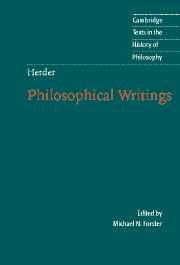Book contents
- Frontmatter
- Contents
- Introduction
- Chronology
- Further reading
- Note on the texts and translation
- Part I General Philosophical Program
- Part II Philosophy of Language
- Part III Philosophy of Mind
- Part IV Philosophy of History
- On the Change of Taste (1766)
- Older Critical Forestlet (1767/8) [excerpt on history]
- This Too a Philosophy of History for the Formation of Humanity [an early introduction]
- This Too a Philosophy of History for the Formation of Humanity (1774)
- Part V Political Philosophy
- Index
- Cambridge texts in the history of philosophy
Older Critical Forestlet (1767/8) [excerpt on history]
Published online by Cambridge University Press: 05 June 2012
- Frontmatter
- Contents
- Introduction
- Chronology
- Further reading
- Note on the texts and translation
- Part I General Philosophical Program
- Part II Philosophy of Language
- Part III Philosophy of Mind
- Part IV Philosophy of History
- On the Change of Taste (1766)
- Older Critical Forestlet (1767/8) [excerpt on history]
- This Too a Philosophy of History for the Formation of Humanity [an early introduction]
- This Too a Philosophy of History for the Formation of Humanity (1774)
- Part V Political Philosophy
- Index
- Cambridge texts in the history of philosophy
Summary
The plan in accordance with which Herr Winckelmann wanted to execute his excellent history [Geschichte] of art is by his own advertisement this, and I confess that in a modern book such an advertisement has seldom been so greatly executed: “The history of the art of antiquity is no mere narration of the chronological sequence and of the changes in it, but I understand the word history [Geschichte] in the broader meaning that it has in the Greek language, and my intention is to supply an attempt at a doctrinal structure [Lehrgebäude].”
I shall leave it to certain philologists of my nation to collect together the loci for many meanings from several lists and dictionaries. To keep it nice and short!, the word history [Historie] can according to its Greek origin mean “observation, knowledge, science,” and a history is of course also a correct narration of things that have happened.
But a doctrinal structure? Did the Greeks want to construct such a thing in their history [Geschichte]? Can such a thing be constructed so that the work still remains history? – For my purpose it does not yet matter whether history be a narration of complicated occurrences [Begebenheiten] or of simple productions, whether of data or of facta. Even a history of the thoughts, the science, the art of a people, or of many peoples, is, however simple the subject matter may be, still a history of occurrences, deeds, changes.
- Type
- Chapter
- Information
- Herder: Philosophical Writings , pp. 257 - 267Publisher: Cambridge University PressPrint publication year: 2002

